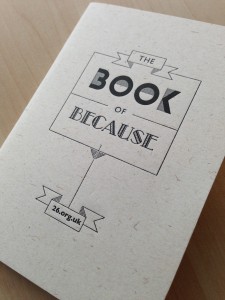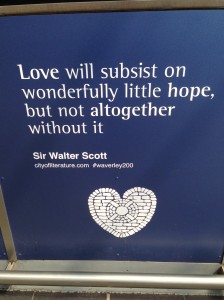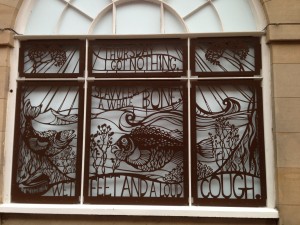Did you know that writer William Wordsworth born on this day in 1770? It’s a date that’s lodged in my mind as it links to a creative project that I was part of, linked to the poet and his Lake District home of Dove Cottage.
I was one of 26 writers who took part in in a creative writing project inspired by postcodes. The letter and number combinations identified a place that we used as inspiration to write a piece of 62 words exactly – a form known as a sestude.
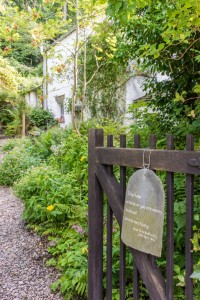
Dove cottage
My postcode was for Dove Cottage in Grasmere – home to the famous poet William Wordsworth and his family from 1799 to 1808.
I immediately felt lucky to have such a place rich in writing history from which to draw inspiration, but also a little daunted. Although I knew of Wordworth’s work, and had studied some of his poetry, he wasn’t one of my favourites. I dismissed him as a bit safe and chocolate boxy.
But I was very wrong, as I learned when I visited the house and the exhibition space that now sits alongside it. Wordsworth was a great walker and adventurer. He visited France during the Revolution and had a relationship and a daughter there. His poetry reflects changing social and political landscapes, and together with his sister Dorothy and his family, they were a real part of the small community they lived in.
Taking inspiration from objects
I visited Dove Cottage on a bright, sunny day, perfect for the tourists that now flock there. In the museum and the house, I was fascinated by the objects that would have been familiar to Wordsworth and his family.
The page of Dorothy’s diary, open at the day they saw the daffodils, that inspired his most often quoted poem, shows how important her records are in shaping Wordsworth’s work.
Pens, a writing desk, a small suitcase – these told the story of a man who once travelled, but came to settle and write in this place.
And, displayed in a glass case, was the rich velvet coat he wore when he was presented to Queen Victoria as poet laureate. In all likelihood, the most expensive piece of clothing he ever wore. I imagined him feeling rather uncomfortable in it, being more at home in the tough boots that carried him miles in walks over the hills.
From scribbled words to published piece
I drank in so much information among the exhibits, and then went and sat, in the garden behind the house and wrote a few words in my notebook.
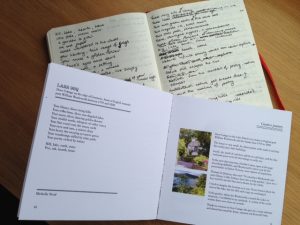 After many further scribblings and through many more pages of words, I eventually condensed my thoughts down to the 62 that make up my sestude. It was was published online and in a beautiful little pamplet along with other pieces that reflect places as diverse as Seamus Heaney’s football club to the Heinz factory.
After many further scribblings and through many more pages of words, I eventually condensed my thoughts down to the 62 that make up my sestude. It was was published online and in a beautiful little pamplet along with other pieces that reflect places as diverse as Seamus Heaney’s football club to the Heinz factory.
Looking back, I can trace every thought and idea in those 62 words to my time at Dove Cottage.
“To introduce Wordsworth into one’s library is like letting a bear into a tulip garden,” said Thomas de Quincey. The quote illustrated on one of the displays made me smile, and painted a picture of a robust, and vigorous man, with a passion for books. It also gave me that key word ‘library’ – a good one to use in relation to a writer.
The coat appears, as does Dorothy’s diary, and the garden path that I took at the back of the house. And seeing the house in its context, I wanted to reflect a sense of the landscape that inspired the writer and me, with its distinctive fells and lakes. That gave me a structure for my poem.
I still have the notebook. The first words I wrote were: hill, lake, hearth, home. They remain in my finished sestude, as a tribute to the power of place to inspire. Here it is:
Your library, these rising hills
Your reflections, these sun-dappled lakes
Your muse, these dancing golden flowers
Your wistful words, whispers of valley voices
Your fine court coat, the mossy earth
Your eyes and ears, a sister’s diary
Your heart, the swaying sycamore green
Your wanderings stilled by slate paths
Your poetry etched by nature.
Hill, lake, earth, stone
Pen, ink, hearth, home.

